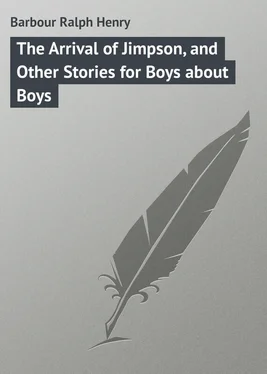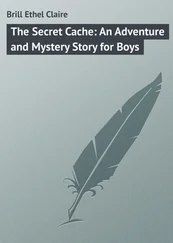Ralph Barbour - The Arrival of Jimpson, and Other Stories for Boys about Boys
Здесь есть возможность читать онлайн «Ralph Barbour - The Arrival of Jimpson, and Other Stories for Boys about Boys» — ознакомительный отрывок электронной книги совершенно бесплатно, а после прочтения отрывка купить полную версию. В некоторых случаях можно слушать аудио, скачать через торрент в формате fb2 и присутствует краткое содержание. ISBN: , Жанр: foreign_prose, foreign_children, на английском языке. Описание произведения, (предисловие) а так же отзывы посетителей доступны на портале библиотеки ЛибКат.
- Название:The Arrival of Jimpson, and Other Stories for Boys about Boys
- Автор:
- Жанр:
- Год:неизвестен
- ISBN:http://www.gutenberg.org/ebooks/45689
- Рейтинг книги:3 / 5. Голосов: 1
-
Избранное:Добавить в избранное
- Отзывы:
-
Ваша оценка:
- 60
- 1
- 2
- 3
- 4
- 5
The Arrival of Jimpson, and Other Stories for Boys about Boys: краткое содержание, описание и аннотация
Предлагаем к чтению аннотацию, описание, краткое содержание или предисловие (зависит от того, что написал сам автор книги «The Arrival of Jimpson, and Other Stories for Boys about Boys»). Если вы не нашли необходимую информацию о книге — напишите в комментариях, мы постараемся отыскать её.
The Arrival of Jimpson, and Other Stories for Boys about Boys — читать онлайн ознакомительный отрывок
Ниже представлен текст книги, разбитый по страницам. Система сохранения места последней прочитанной страницы, позволяет с удобством читать онлайн бесплатно книгу «The Arrival of Jimpson, and Other Stories for Boys about Boys», без необходимости каждый раз заново искать на чём Вы остановились. Поставьте закладку, и сможете в любой момент перейти на страницу, на которой закончили чтение.
Интервал:
Закладка:
Barclay, ’99, laid his pen aside with slow deliberateness, marked his place in the big Greek lexicon beside him, and took up the letter. It was addressed to the editor of the Quarmazi, and was signed “Hiram G. Larkin, Yale, ’99.” The writer asked to be put in communication with some student in the rival college who was interested in checkers. He dwelt enthusiastically on the formation of a dual checker league. He pointed out the fact that although chess, whist and other games of skill and science were recognized and participated in each year by teams representing the two universities, the noble game of checkers had been hitherto wofully neglected. He suggested that teams be formed at each university, and that a tournament be played to decide the championship.
When Barclay laid aside the letter, his long and ascetic face held an expression of enthusiastic delight. The one dissipation and hobby of Barclay’s studious existence was checkers. He held a college-wide reputation as a “grind” of the most pronounced type. Barclay did not look down on the usual pleasures and frolics of the undergraduate; they simply had for him no appeal. He had nothing against football or baseball or track athletics; but he felt no enthusiasm for any of them.
Of course he was always glad when the college teams won; he was “patriotic” to a high degree, and sometimes, when the bonfires burned and the students cheered and sang, he acknowledged a wish, lying deep down in his heart, that he, too, might be able to derive pleasurable emotions from such celebrations. Barclay, in short, loved Xenophanes and Xenophon; and next to them, checkers.
Before he went to bed that night he answered the Yale man’s letter; indorsed the project voluminously; pledged immediate cooperation, and remained fraternally his, Simonides P. Barclay.
I have no intention of specifying in detail the steps which resulted in the formation of the Intercollegiate Checkers Association. Barclay and Larkin wrote to each other at least every other day, and at the end of three weeks the matter was settled – not, perhaps, just as they had hoped for. Barclay had labored heroically to find a membership for the Checkers Club, but without avail. None wanted to join. Many scoffed, and instead of enthusiasm, he awakened only ridicule. And the Yale man reported like results. So when the rival teams met in a private room in Young’s Hotel one December day, they consisted of just Larkin, Yale, ’99, and Barclay.
The tournament was held behind tightly closed doors; consequently I am unable to report the play for the reader’s benefit. Enough that deep silence and undoubted skill held sway until dusk, at which time the two teams passed into the dining-hall and ate a dinner, at which much good feeling was displayed by both, and at which the day’s play was rehearsed scientifically, from oysters to coffee. The teams then shook hands and parted at the entrance.
Barclay boarded a car and returned to college, filled with overwhelming triumph. He had won three out of the seven games and drawn two. The checkers championship rested with Harvard!
Such a spirit of jubilation possessed Barclay that when he reached his unadorned room and had changed his gold-rimmed glasses for his reading spectacles, he found that Greek for once did not satisfy. He tried light reading in the form of a monograph on the origin of Greek drama, but even then his attention wandered continually. He laid down the book, wiped his glasses thoughtfully and frowned at the green lamp-shade. Plainly something was wrong; but what? He pondered deeply for several minutes. Then his brow cleared, and he settled his “specs” over his lean nose again; he had found the trouble.
“The victory,” said Barclay, soberly, to the lamp-shade, “demands a celebration!”
The more he thought of it the more evident it appeared that the day’s triumph over the Yale Checkers Club deserved some sort of a public jubilee. He might, considered Barclay, put his head out of the window and cheer. But he wasn’t sure that he knew how. Or he might shoot off a revolver – if he had one. Or he might start a bonfire – ah, that was it; a bonfire! The idea appealed strongly to him; and he remembered that as a boy on a New Hampshire farm bonfires had ever moved him strangely.
He arose and thrust his feet into a pair of immense overshoes, tied a muffler about his long neck, donned his worn ulster, turned down the lamp, and passed out of the room. Yes, he would celebrate with a bonfire. A victory over Yale at checkers was quite as important in Barclay’s estimation as a triumph over the blue-stockinged football warriors.
Fifteen minutes later a window at the upper end of the college yard was slammed open, and a voice bawled into the frosty night:
“Heads out! All heads out!”
Then up and down the quadrangle, casements were raised and broad beams of light glowed out into the gloom, while dozens of other voices passed on the slogan:
“Heads out, fellows! Heads out!”
“What’s up?” cried a thin voice from an upper window of Thayer.
“Bonfire in front of University!” was the answer.
“Bonfire in the yard! All heads out!” sped the cry.
“Everybody get wood!” shouted a voice from Weld.
“Everybody get wood!” shouted half a hundred other voices.
Then windows were shut and eager youths clattered down-stairs and into the yard, and suddenly the quiet night had become a pandemonium. In front of University Hall a lone figure fed, with shingles and odd bits of wood, a small bonfire, which cast its wan glow against the white front of the sober pile, as if dismayed at its own temerity. For bonfires in the yard are strictly forbidden, and it was many years before that the last one had sent its sparks up in front of University. Barclay knew this, and welcomed the danger of probation or dismissal as adding an appropriate touch of the grand and heroic to his celebration.
“Everybody get wood!” “What’s it for?” “’Rah for the bonfire!” “Who’s doing it?” “Wood, wood, get wood, fellows!”
One of the first to reach the scene was Cobb, 1901. A dozen others were close behind him.
“Hello, what’s up? What we celebrating?” he asked breathlessly; then he caught a glimpse of the thin, bespectacled visage of Barclay, and gasped, “Why, why, it’s old Barclay!”
“’Rah for Barclay, old grind!” shouted another. “He’s the stuff! Everybody get wood!”
At that moment a worn-out hen-coop arrived suddenly on the scene, and a shower of sparks told that the fire was gaining courage.
“But, say, old man, what’s it all about?” asked Cobb.
“We are celebrating a victory over Yale,” answered Barclay, soberly, as he adjusted a plank with his foot. There was no undue excitement exhibited by this tall figure in the long ulster, but underneath his calm the blood raced madly through his veins, and a strange and well-nigh uncontrollable joy possessed him as the flames leaped higher and higher. He stooped and picked a brand from the edge of the fire. He waved it thrice about his head, sending the flaring sparks over the ever-increasing crowd.
“Hooray!” he yelled, in queer, uncanny tones.
“’Rah, ’rah, ’rah!” answered the throng. “Everybody get wood!”
“But what’d we do to ’em?” asked Cobb, wonderingly. “What was the victory?”
“Won the checker championship!” answered Barclay, proudly.
A roar of laughter went up; fellows fell on their neighbors’ necks and giggled hysterically; a football man sat down in the fire and had to be rescued by his friends; Cobb hugged Barclay and patted him on the back.
“Good old Barclay!” he gurgled. “Oh, good old Barclay! Won the checker champ – champ – champ – oh, dear, oh, dear! Somebody hit me before I – I – ”
Читать дальшеИнтервал:
Закладка:
Похожие книги на «The Arrival of Jimpson, and Other Stories for Boys about Boys»
Представляем Вашему вниманию похожие книги на «The Arrival of Jimpson, and Other Stories for Boys about Boys» списком для выбора. Мы отобрали схожую по названию и смыслу литературу в надежде предоставить читателям больше вариантов отыскать новые, интересные, ещё непрочитанные произведения.
Обсуждение, отзывы о книге «The Arrival of Jimpson, and Other Stories for Boys about Boys» и просто собственные мнения читателей. Оставьте ваши комментарии, напишите, что Вы думаете о произведении, его смысле или главных героях. Укажите что конкретно понравилось, а что нет, и почему Вы так считаете.












